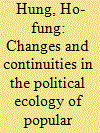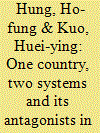|
|
|
Sort Order |
|
|
|
Items / Page
|
|
|
|
|
|
|
| Srl | Item |
| 1 |
ID:
079962


|
|
|
|
|
| Publication |
2007.
|
| Summary/Abstract |
This article will delve into the historical roots of Chinese environmentalism. A wave of recent research has unearthed numerous instances of Chinese state-society conflicts, as well as the ecological crisis precipitated by drastic population and commercial growth in 18th-century China. Based on a survey of protest events derived from archival sources, this contribution analyzes how the mounting ecological crisis and falling capacity of the Qing state in the 18th and 19th centuries generated changing forms of popular protests as responses to the "externalities of development." It is found that when the Qing's regime capacity peaked in the early 18th century, most popular protests were peaceful and were resolved through compromises between officials and protesters. Amid the administrative breakdown in the 19th century, however, many protests escalated into violent confrontations, while others developed into "appeals to the capital" (jingkong ), a litigation process that enabled local communities to seek the support of the central government in their struggle with predatory local officials. Remarkably, some repertoires and patterns of environmental protests in contemporary China can be traced back to the Qing times, which raises questions about whether today's environmental protests are completely novel, or whether certain continuities are inherent in the deep-seated tradition of state-society conflict and negotiation in China's late imperial history
|
|
|
|
|
|
|
|
|
|
|
|
|
|
|
|
| 2 |
ID:
190498


|
|
|
|
|
| Publication |
Cambridge, Cambridge University Press, 2022.
|
| Description |
xxi, 297p.:figures, tablehbk
|
| Standard Number |
9781108840330
|
|
|
|
|
|
|
|
|
|
|
|
Copies: C:1/I:1,R:0,Q:0
Circulation
| Accession# | Call# | Current Location | Status | Policy | Location | IssuedTo | DueOn |
| 060366 | 330.95125/HUN 060366 | Main | Issued | General | | RF020 | 29-Nov-2023 |
|
|
|
|
| 3 |
ID:
113876


|
|
|
|
|
| Publication |
2012.
|
| Summary/Abstract |
Hong Kong's civil society has remained vibrant since the sovereignty handover in 1997, thanks to an active defense by the democratic movement against Beijing's attempts to control civil liberties. Hong Kong is becoming mainland China's offshore civil society, serving as a free platform for information circulation and organizing among mainland activists and intellectuals.
|
|
|
|
|
|
|
|
|
|
|
|
|
|
|
|
| 4 |
ID:
100998


|
|
|
|
|
| Publication |
2010.
|
| Summary/Abstract |
In turning the vast and diverse territory of the Qing Empire into a singular nation-state, Beijing has kept redefining its conception and institution of nationhood in response to challenges from the recalcitrant or not-yet-incorporated peripheral regions including Tibet, Hong Kong, and Taiwan. Since 1949, Beijing has attempted to solve the Tibet and Taiwan questions with the institutional design of "one country, two systems." This design, widely thought of as a 1980s invention, can in fact be dated back to the early 1950s with respect to Tibet. This design has been far from successful in Tibet and Taiwan. While the "one country, two systems" experiment in Tibet failed with the Lhasa uprising and the flight of the Dalai Lama in 1959, the proposal of "one country, two systems" lost its appeal and had become a taboo among politicians of all strips in Taiwan by the 21st century. In this article, we argue that the success of "one country, two systems" requires a very delicate balance and virtuous interaction between the political center in Beijing and the elite, as well as popular classes, in the periphery concerned. It can easily be jeopardized if the center tilts too much to the left or right.
|
|
|
|
|
|
|
|
|
|
|
|
|
|
|
|
|
|
|
|
|